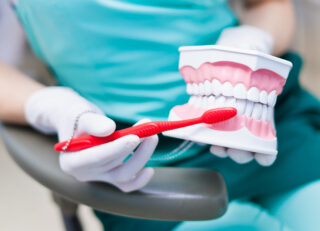The Power of Brushing

Teeth brushing is a simple yet vital part of your daily routine that has a profound impact on your oral health. By dedicating just a few minutes each day to this important task, you can prevent a multitude of oral health problems and maintain a bright, confident smile. In this blog, we will explore the significance of brushing, the proper techniques, and tips to enhance your brushing routine for optimal dental health.
Brushing your teeth serves as the foundation of a healthy oral hygiene routine. Regular brushing helps on the removal of plaque, a sticky film containing bacteria that forms on teeth and gums. If left unattended, plaque can lead to tooth decay, cavities, gum disease, and bad breath. Brushing also helps to remove food particles, debris, and surface stains, giving you a fresh and clean feeling.
To maximize the efficiency of your brushing routine, it is critical to use proper techniques. Here are some key points to consider:
- Select the right toothbrush: Choose a toothbrush with soft bristles and a size that comfortably fits your mouth. Electric toothbrushes could be more efficient in removing plaque.
- Brush at least twice a day: Brushing in the morning and before bedtime is recommended to remove bacteria and plaque buildups.
- Angle your brush: Hold the toothbrush at a 45-degree angle to the gum line. Use gentle, circular motions to clean all tooth surfaces, including the outer, inner, and chewing surfaces.
- Don’t forget your tongue: Gently brush your tongue to remove bacteria and freshen your breath.
- Brush for at least two minutes: Set a timer or use a toothbrush with a built-in timer to ensure you brush for the recommended duration.
To take your brushing routine to the next level, consider the following tips:
- Use fluoride toothpaste: Fluoride helps strengthen tooth enamel, making it more resistant to decay.
- Floss regularly: Brushing alone cannot reach the spaces between your teeth, so integrate flossing into your daily routine to remove plaque and food particles in between the teeth.
- Use mouthwash: After brushing and flossing, rinse with mouthwash to further freshen breath and kill bacteria.
- Replace your toothbrush: Toothbrushes wear out over time, losing their efficiency. Change your brush every three to four months, or sooner if the bristles become worn.
- Don’t rush your routine: Brushing should never be hurried. Take your time and pay attention to every tooth surface, ensuring a thorough clean.
Brushing your teeth is a small yet crucial step toward maintaining excellent oral health. By adopting correct brushing techniques, using the proper tools, and integrating additional oral hygiene practices, you can prevent dental problems and enjoy a healthy and fresh smile for years to come. Remember, regular dental check-ups and professional cleanings are equally important for comprehensive dental care. So, make brushing a priority in your daily routine and gain the rewards of a healthy, confident smile.
If you have any questions on teeth brushing or need to book for a dental check-up and clean, please contact us via phone call, online bookings, or email.


One comment
Maple Dental
July 18, 2023 at 5:33 am
vhj